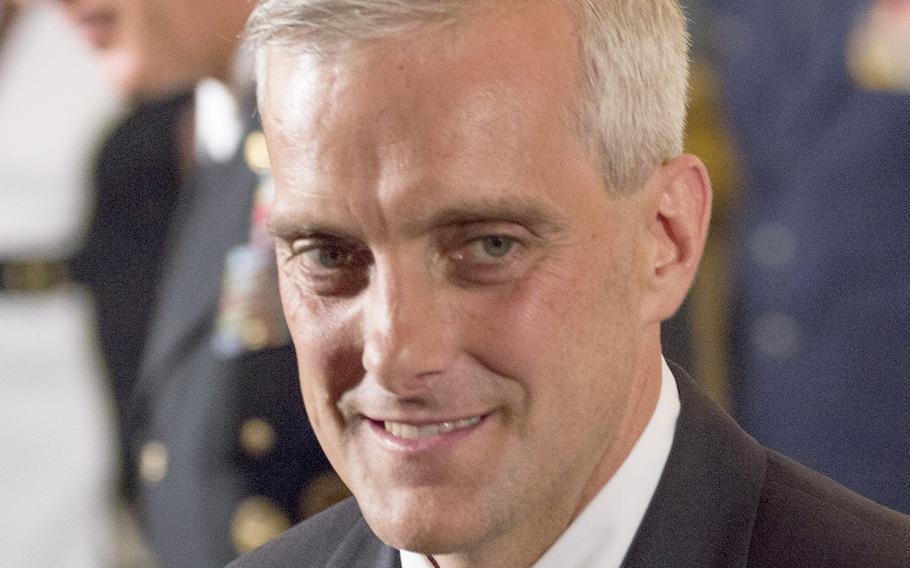
Then-White House Chief of Staff Denis McDonough, now President Joe Biden's pick to serve as Secretary of Veterans Affairs, at a Medal of Honor ceremony in 2014. (Joe Gromelski/Stars and Stripes)
WASHINGTON — The White House proposed a boost of $8.5 billion for the Department of Veterans Affairs in fiscal 2022, largely because of an increase in veterans using private-sector doctors, VA Secretary Denis McDonough said.
McDonough testified Thursday before a House Appropriations subcommittee about President Joe Biden’s proposed budget for the VA. For health care specifically, Biden proposed $97.5 billion — an increase of $7.6 billion from 2021.
When questioned about the budget increase Thursday, McDonough cited the cost of the VA Mission Act, a bipartisan measure approved in 2018 to expand veterans’ access to private doctors. The bill went into effect in 2019.
“Much of the growth we’re requesting is as a result of care in the community,” McDonough said. “Going back to the moment when the Mission Act was signed into law, you see a significant increase of care going into the community.”
McDonough faced questions about the need for the funding boost after other recent increases over the past year. The American Rescue Plan, approved by Congress last month, allotted $17 billion to the agency. The CARES Act, approved last year in response to the coronavirus pandemic, gave the department nearly $20 billion.
Rep. John Carter, R-Texas, said he was surprised by another proposed increase for the VA.
“How should we reconcile this with the billions provided in the American Rescue Plan?” Carter asked. “Is it for new initiatives? And if so, are they truly necessary?”
The CARES Act — the first economic stimulus bill approved by Congress during the pandemic — provided funding for the VA to buy coronavirus testing kits and personal protective equipment, as well as expand telehealth capabilities and send veterans outside the VA for emergency care, among other things.
The money included for the VA in the American Rescue Plan was earmarked for veterans’ health care, staffing, suicide prevention, women’s health, telehealth, homelessness, state-run veterans’ homes and improvements to medical facilities. Last month, McDonough told Congress the funding was needed because of an increase in demand for health care after veterans deferred appointments during the coronavirus pandemic.
“The CARES Act funding was really important for ongoing reaction to the pandemic,” McDonough said. “The American Rescue Plan funding is critically important to respond to the impacts of the pandemic. This last piece is for increased expenditures for care in the community. It’s part of a trend line that dates back to 2019 when the Mission Act was signed into law.”
Rep. Debbie Wasserman Schultz, D-Fla., said Tuesday she was concerned about the growing cost of private-sector care. Schultz voted against the Mission Act because of the strain she predicted it would put on the federal budget, she said.
“We all agree we need to provide for veterans’ health care, but it’s becoming increasingly difficult to plan any long-term goals for any other initiatives to help veterans,” she said. “Any increase in discretionary spending is swallowed up.”
The VA’s community care programs were included under mandatory spending, rather than discretionary, before Congress passed the VA Mission Act. Mandatory spending, which includes entitlement programs, does not go through the congressional appropriations process.
McDonough said Tuesday he was open to moving the community care budget back to mandatory spending but that it would require Congress to take action.
“We’ve been having those conversations but frankly that’s a conversation that we have to have with you,” McDonough said.
The hearing marked the first time McDonough defended the proposed funding increase to Congress. He’s expected to return to Capitol Hill as lawmakers work on the federal budget for fiscal 2022.
wentling.nikki@stripes.com Twitter: @nikkiwentling